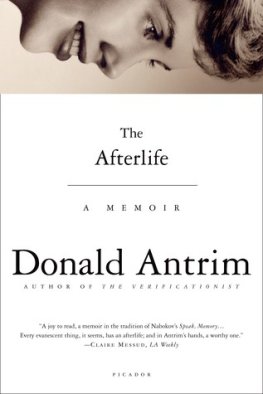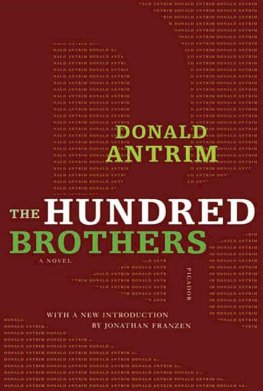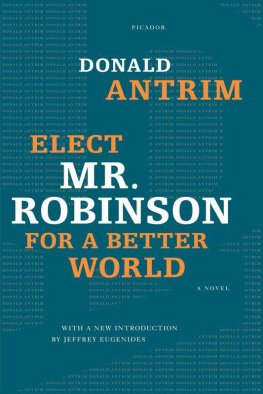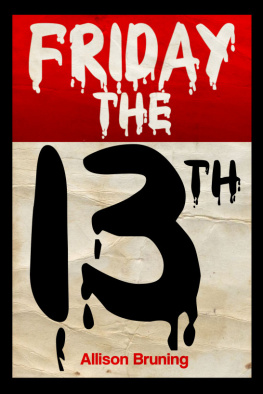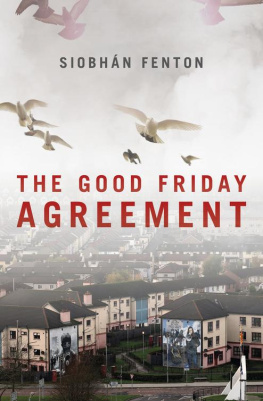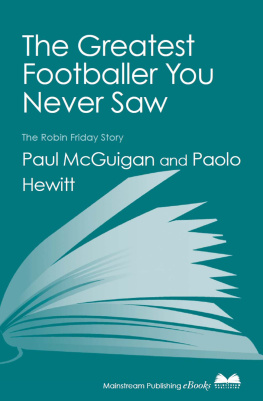Donald Antrim - One Friday in April
Here you can read online Donald Antrim - One Friday in April full text of the book (entire story) in english for free. Download pdf and epub, get meaning, cover and reviews about this ebook. year: 2021, publisher: W. W. Norton & Company, genre: Non-fiction. Description of the work, (preface) as well as reviews are available. Best literature library LitArk.com created for fans of good reading and offers a wide selection of genres:
Romance novel
Science fiction
Adventure
Detective
Science
History
Home and family
Prose
Art
Politics
Computer
Non-fiction
Religion
Business
Children
Humor
Choose a favorite category and find really read worthwhile books. Enjoy immersion in the world of imagination, feel the emotions of the characters or learn something new for yourself, make an fascinating discovery.
- Book:One Friday in April
- Author:
- Publisher:W. W. Norton & Company
- Genre:
- Year:2021
- Rating:3 / 5
- Favourites:Add to favourites
- Your mark:
- 60
- 1
- 2
- 3
- 4
- 5
One Friday in April: summary, description and annotation
We offer to read an annotation, description, summary or preface (depends on what the author of the book "One Friday in April" wrote himself). If you haven't found the necessary information about the book — write in the comments, we will try to find it.
One Friday in April — read online for free the complete book (whole text) full work
Below is the text of the book, divided by pages. System saving the place of the last page read, allows you to conveniently read the book "One Friday in April" online for free, without having to search again every time where you left off. Put a bookmark, and you can go to the page where you finished reading at any time.
Font size:
Interval:
Bookmark:

ONE FRIDAY IN APRIL

A Story of Suicide and Survival
DONALD ANTRIM

W.W. NORTON & COMPANY
Independent Publishers Since 1923
For Marija
Ask not what disease the person has, but rather, what person the disease has.
SIR WILLIAM OSLER
ONE FRIDAY IN APRIL
ONE FRIDAY IN APRIL 2006, I SPENT THE AFTERNOON AND evening pacing the roof of my apartment building in Brooklyn, climbing down the fire-escape ladder and hanging by my hands from the railing, then climbing back up with sore palms and lying on the roof, in a ball, or stretched out on my back or on my stomach, maybe peering surreptitiously over the roof ledge. The roof is painted silver. The building is four stories tall. A group of my friends, each of whom had been on the phone with me, one after the other, all through the morning, when Id been alone and dialing wildly, had got busy calling each other. Janice owned a car, and she and Nicky were coming across the bridge from Manhattan, but there was traffic, and no one knew where I was.
From the roof, the world seemed to scream. I heard sirenspolice, ambulance, and fire. What agency would come for me? A helicopter was flying overhead and circling back. The woman Id just run from, the woman who had rushed over ahead of the others, who had been with me downstairs in my apartment, my partner then, Regan, thought that Id gone to the street. We had been fighting over something Id done. Id hurt her, and we were both in anguish. She spoke harshly, and I ran away to die and end her burden. She charged after me, but the wrong way, down instead of up, out the front door of the building and toward the avenue. The sun was setting, and the sky over New Jersey was orange, and I was in my socks, shivering. I was afraid for my life. I didnt know why I had to fall from the roof, why that was mine to do.
When telling the story of my illness, I try not to speak about depression. I prefer to call it suicide. The American novelist William Styron, in his memoir Darkness Visible: A Memoir of Madness, argues that the word depression is inadequate to describe this illness, and I agree. A depression is a concavity, a sloping downward and a return. Suicide, in my experience, is not that. I believe that suicide is a natural history, a disease process, not an act or a choice, a decision or a wish. I do not understand suicide as a response to pain, or as a message to the livingor not only as those things. I do not think of suicide as the act, the death, the fall from a height or the trigger pulled. I see it as a long illness, an illness with origins in trauma and isolation, in deprivation of touch, in violence and neglect, in the loss of home and belonging. It is a disease of the body and the brain, if you make that distinction, but its etiology, its beginning, whether in early or later life, in the family or beyond, is social in nature. I see suicide as a social disease. I will refer to suicide, not depression.
My sickness lasted years. It continued after that Friday on the roof, and went on for more than a decade, through long hospitalizations and more than fifty rounds of electroconvulsive therapy, once known as shock therapy. It lasted through a decade of recovery, relapse, and recovery. Those times seem far removed, though they can also feel recent in memory. Up on the roof, I felt as if I had been dying all my life. I felt that it had begun when I was a little child.
I was hanging from the fire escape. I kept a toehold. The sun was low; the air was cold. I was wearing socks but no shoes, and my palms were scraped and beginning to blister from my letting go a little, one hand at a time, falling out at an angle, sideways or backward, then grabbing fast for the rail, and clutching tight. I gazed down at the concrete patio and the chain-link fence surrounding the backyard. The yard was inaccessible, small, and neglected. My apartment is on the third floor, and windows in my kitchen and bedroom overlook it, though youd have to stick your head out to see much. Id never looked at the yard for more than a minute, or heard anyone in it.
Below me was the small patio area littered with trash, and an outdoor stairwell leading to the locked basement and the boiler. The rest was hard ground. Since that time, since 2006, new people, a family, have moved into the first-floor apartment, and theyve replaced the old chain-link fence with one made of wood and put in a barbecue and a picnic table; I can hear their children when its warm out, along with, on school days, even in the cold winter months, older children, neighborhood kids, playing and screaming on the rooftop playground of the private school a few doors down the street.
Recess was over; school was out; night was falling. I had no children. I held on to the railing. It was less dizzying to look down than up. Clouds blew across the sky. Here and there, I could see people having after-work cocktails on private decks on neighboring roofsit was the beginning of a spring weekend. Now, remembering that day, I wonder what those people might have thought of the man scrambling from fire escape to rooftop and back, letting go with one hand, flopping down on his belly to crane over the edge. Did they imagine that he was doing work, maintenance or repair, some job they couldnt clearly make out? If they had known the mans troubles, had known the man, would they have understood that he was about to die? Or would they have imagined that he was trying to live?
It was getting darker, and I could hear traffic on the street below, people driving home through Brooklyn after work. I was cold; Id been up there a long time. I didnt know that it had been five hours. It could have been any amount of time. I had on pants, a shirt, and socks. My hands and clothes were dirty from the rooftop. My pants fit loosely, and were falling down. Id become thin over the winter. Where was my belt? I shoved my hands in my pockets and squeezed my arms to my sides, trying to get warm.
Id written about my mother, her alcoholic life and her resignation in death, and my role as her son, savior, and abandoner. I began writing the year after she died, too soon for writing to be safe. The book was an accounting of the death of my family. Writing the book had been an excitement, but publishing was an ordeal. The book was a movement from exposition to scene, defense to acceptance, mortification to love. But my old worldsCharlottesville, Gainesville, Miami, Sarasota; all the places of my childhoodwere costly to rebuild. I worked at betrayal, mine of my mother, hers of me, mine of myself.
I was born in Sarasota, Florida, on a September night in 1958. In the story that my mother tells of my birth, I was taken from her by force. Her mother, my grandmother, pulled me out of my mothers arms and kept me. My mother was not allowed to hold me. My father, who had graduated from college the summer before on an ROTC scholarship, was away, training to command tanks at Fort Bragg, North Carolina, where, eleven months later, my sister, Terry, would be born. My mother told me that she and I were distraught; I cried and cried, but her mother would not give me back. There was panic, she told me, and more fighting and crying, and it took my father a day and a night to get there.
Where was my grandfather? I knew my mothers father as a docile, suffering man. When I was very little, hed fallen off the roof of the house, while replacing tiles, and broken his back. The house was a two-story white stucco bungalow with a red tile roof, venetian blinds in the windows, a mowed lawn, a paved driveway and carport, a front door that wasnt used, a guest bedroom downstairs, and three bedrooms upstairs. My sister and I lived with our grandparents when our parents were divorcing for the first time. Terry was five and I was six. We lay awake in separate bedrooms, in the heat. Fans blew. Downstairs, a sun porch with orchids and potted shrubs faced a little square yard planted with orange and tangerine trees. There was wisteria and hibiscus. The air was wet and sticky. Down a little walkway out back was the two-story garage where my grandfather spent part of each day, where he had tools hung on a pegboard, stacked paint cans, a worktable with a vise, and beer in an old refrigerator. The garage smelled of paint thinner, insecticide, and lawnmower gas. My grandfather sat at a bench and mended kitchen-cabinet drawers, or rewired appliances, or sanded wood, while sipping from a can. He chewed cinnamon chewing gum and toothpicks.
Next pageFont size:
Interval:
Bookmark:
Similar books «One Friday in April»
Look at similar books to One Friday in April. We have selected literature similar in name and meaning in the hope of providing readers with more options to find new, interesting, not yet read works.
Discussion, reviews of the book One Friday in April and just readers' own opinions. Leave your comments, write what you think about the work, its meaning or the main characters. Specify what exactly you liked and what you didn't like, and why you think so.


